
Titan II/DMSP Launch, December 12, 1999 |
(Download a higher resolution picture by clicking on any
picture below.) 
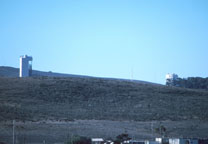 The Terra satellite and its
Atlas IIAS booster are waiting their turn to be launched in the
SLC-3E gantry at left. The top of the SLC-3W gantry can be seen
to the right. SLC-4 is about twice as far away as SLC-3 from this
vantage point.
The Terra satellite and its
Atlas IIAS booster are waiting their turn to be launched in the
SLC-3E gantry at left. The top of the SLC-3W gantry can be seen
to the right. SLC-4 is about twice as far away as SLC-3 from this
vantage point.
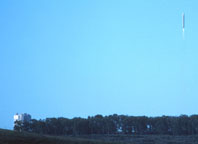 A Defense Department Meteorological
Satellite was launched on a refurbished Titan II ICBM from
SLC-4West at Vandenberg AFB at 9:38 A.M. on December 12, 1999.
The top of the SLC-3W gantry can be seen at left. A row of
Eucalyptus trees has been planted to obscure the view of the
launch pads. The Titan II
still can't be heard as it ascends from South Base.
A Defense Department Meteorological
Satellite was launched on a refurbished Titan II ICBM from
SLC-4West at Vandenberg AFB at 9:38 A.M. on December 12, 1999.
The top of the SLC-3W gantry can be seen at left. A row of
Eucalyptus trees has been planted to obscure the view of the
launch pads. The Titan II
still can't be heard as it ascends from South Base.
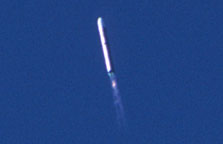 The
flame of the Nitrogen Tetroxide
fueled engines of the Titan II is transparent.
The
flame of the Nitrogen Tetroxide
fueled engines of the Titan II is transparent.
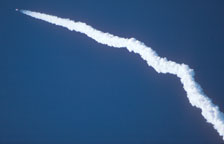 The Titan II
didn't leave a visible contrail
until it was several miles high.
The Titan II
didn't leave a visible contrail
until it was several miles high.
 The contrail of the Titan II is
quickly twisted by upper level winds.
The contrail of the Titan II is
quickly twisted by upper level winds.
 Link to the Defence
Meteorological Satellite Program Page of the National Oceanographic
and Atmospheric Administration. (Nowhere on the NOAA home or
welcome pages does it spell out what NOAA stands for.).
Link to the Defence
Meteorological Satellite Program Page of the National Oceanographic
and Atmospheric Administration. (Nowhere on the NOAA home or
welcome pages does it spell out what NOAA stands for.).
 Link to the Defence Meteorological Satellite Program Page of
the Mission and Spacecraft Library at NASA-JPL.
Link to the Defence Meteorological Satellite Program Page of
the Mission and Spacecraft Library at NASA-JPL.
![]() Link to the Defence Meteorological Satellite Program Page of
the High
Energy Astrophysics Science Archive Reesearch Center.
Link to the Defence Meteorological Satellite Program Page of
the High
Energy Astrophysics Science Archive Reesearch Center.
 Link to the Defence
Meteorological Satellite Program Page of the United
States Space Command.
Link to the Defence
Meteorological Satellite Program Page of the United
States Space Command.
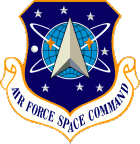 Link to the Titan II Fact Sheet of the United
States Space Command.
Link to the Titan II Fact Sheet of the United
States Space Command.
![]() Link to the Titan II Fact Sheet of the Air Force Space and
Missile Systems Center.
Link to the Titan II Fact Sheet of the Air Force Space and
Missile Systems Center.
Link to the Titan II Launch Vehicle Description of the 30th Space Wing at Vandenberg Air Force Base.
![]() Link to the Titan II Product Page of Lockheed-Martin Astronautics.
Link to the Titan II Product Page of Lockheed-Martin Astronautics.
 Book about
missiles and rockets available from
Book about
missiles and rockets available from 
The Missile and Space Race by Alan J. Levine. Here is a history of the development of military missiles and space travel from World War II to the American visits to the Moon in 1969-1972. It stresses the relationship between the early stages of space exploration and the arms race, and that a dual path led to space flight. One was the development of unmanned long-range war rockets, the other, less often noted, was the rocket-powered research plane. The first path led through the intercontinental ballistic missile to the first artificial satellites and space capsule; the latter, more uniquely American, through the X-series and Skyrocket rocket planes to the X-15, and ultimately to the Space Shuttle. The early part of the book focuses on the Soviet-American race to develop the ICBM in the 1950s, and the first satellites, with particular attention paid to the events and reactions that followed the flight of Sputnik I in 1957 and the subsequent missile gap era.
Link to the home page of the ![]() 30th
Space Wing
30th
Space Wing
Call the Vandenberg Air Force Base Launch Hotline at (805) 606-1857 for current launch schedule information.
 Link to the NASA rocket launch manifest
Link to the NASA rocket launch manifest
For national and international space coverage visit SPACE.com
Brian Webb's Rawhide Space Page provides launch schedule and ham radio information.
Send a message to Brian.
Go to home page of the Goleta Air and Space Museum.